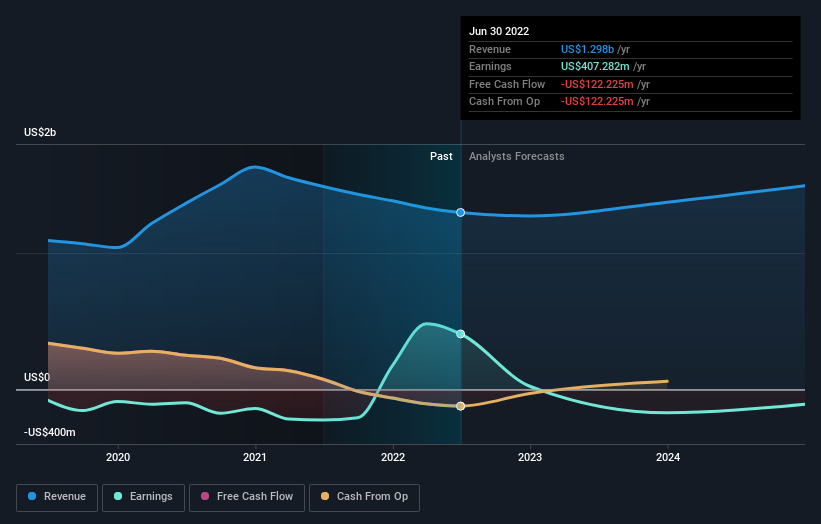- United States
- /
- Health Care REITs
- /
- NasdaqGS:DHC
After losing 63% in the past year, Diversified Healthcare Trust (NASDAQ:DHC) institutional owners must be relieved by the recent gain

A look at the shareholders of Diversified Healthcare Trust (NASDAQ:DHC) can tell us which group is most powerful. The group holding the most number of shares in the company, around 79% to be precise, is institutions. Put another way, the group faces the maximum upside potential (or downside risk).
Last week's US$55m market cap gain would probably be appreciated by institutional investors, especially after a year of 63% losses.
Let's take a closer look to see what the different types of shareholders can tell us about Diversified Healthcare Trust.
View our latest analysis for Diversified Healthcare Trust

What Does The Institutional Ownership Tell Us About Diversified Healthcare Trust?
Many institutions measure their performance against an index that approximates the local market. So they usually pay more attention to companies that are included in major indices.
Diversified Healthcare Trust already has institutions on the share registry. Indeed, they own a respectable stake in the company. This suggests some credibility amongst professional investors. But we can't rely on that fact alone since institutions make bad investments sometimes, just like everyone does. It is not uncommon to see a big share price drop if two large institutional investors try to sell out of a stock at the same time. So it is worth checking the past earnings trajectory of Diversified Healthcare Trust, (below). Of course, keep in mind that there are other factors to consider, too.

Since institutional investors own more than half the issued stock, the board will likely have to pay attention to their preferences. Our data indicates that hedge funds own 5.5% of Diversified Healthcare Trust. That catches my attention because hedge funds sometimes try to influence management, or bring about changes that will create near term value for shareholders. Our data shows that BlackRock, Inc. is the largest shareholder with 17% of shares outstanding. With 16% and 5.5% of the shares outstanding respectively, The Vanguard Group, Inc. and Flat Footed LLC are the second and third largest shareholders.
On further inspection, we found that more than half the company's shares are owned by the top 7 shareholders, suggesting that the interests of the larger shareholders are balanced out to an extent by the smaller ones.
Researching institutional ownership is a good way to gauge and filter a stock's expected performance. The same can be achieved by studying analyst sentiments. There are plenty of analysts covering the stock, so it might be worth seeing what they are forecasting, too.
Insider Ownership Of Diversified Healthcare Trust
The definition of company insiders can be subjective and does vary between jurisdictions. Our data reflects individual insiders, capturing board members at the very least. The company management answer to the board and the latter should represent the interests of shareholders. Notably, sometimes top-level managers are on the board themselves.
Insider ownership is positive when it signals leadership are thinking like the true owners of the company. However, high insider ownership can also give immense power to a small group within the company. This can be negative in some circumstances.
Our information suggests that Diversified Healthcare Trust insiders own under 1% of the company. It has a market capitalization of just US$311m, and the board has only US$961k worth of shares in their own names. Many tend to prefer to see a board with bigger shareholdings. A good next step might be to take a look at this free summary of insider buying and selling.
General Public Ownership
With a 16% ownership, the general public, mostly comprising of individual investors, have some degree of sway over Diversified Healthcare Trust. While this group can't necessarily call the shots, it can certainly have a real influence on how the company is run.
Next Steps:
It's always worth thinking about the different groups who own shares in a company. But to understand Diversified Healthcare Trust better, we need to consider many other factors. Be aware that Diversified Healthcare Trust is showing 4 warning signs in our investment analysis , and 3 of those don't sit too well with us...
If you would prefer discover what analysts are predicting in terms of future growth, do not miss this free report on analyst forecasts.
NB: Figures in this article are calculated using data from the last twelve months, which refer to the 12-month period ending on the last date of the month the financial statement is dated. This may not be consistent with full year annual report figures.
New: Manage All Your Stock Portfolios in One Place
We've created the ultimate portfolio companion for stock investors, and it's free.
• Connect an unlimited number of Portfolios and see your total in one currency
• Be alerted to new Warning Signs or Risks via email or mobile
• Track the Fair Value of your stocks
Have feedback on this article? Concerned about the content? Get in touch with us directly. Alternatively, email editorial-team (at) simplywallst.com.
This article by Simply Wall St is general in nature. We provide commentary based on historical data and analyst forecasts only using an unbiased methodology and our articles are not intended to be financial advice. It does not constitute a recommendation to buy or sell any stock, and does not take account of your objectives, or your financial situation. We aim to bring you long-term focused analysis driven by fundamental data. Note that our analysis may not factor in the latest price-sensitive company announcements or qualitative material. Simply Wall St has no position in any stocks mentioned.
About NasdaqGS:DHC
Diversified Healthcare Trust
DHC is a real estate investment trust, or REIT, focused on owning high-quality healthcare properties located throughout the United States.
Undervalued unattractive dividend payer.

